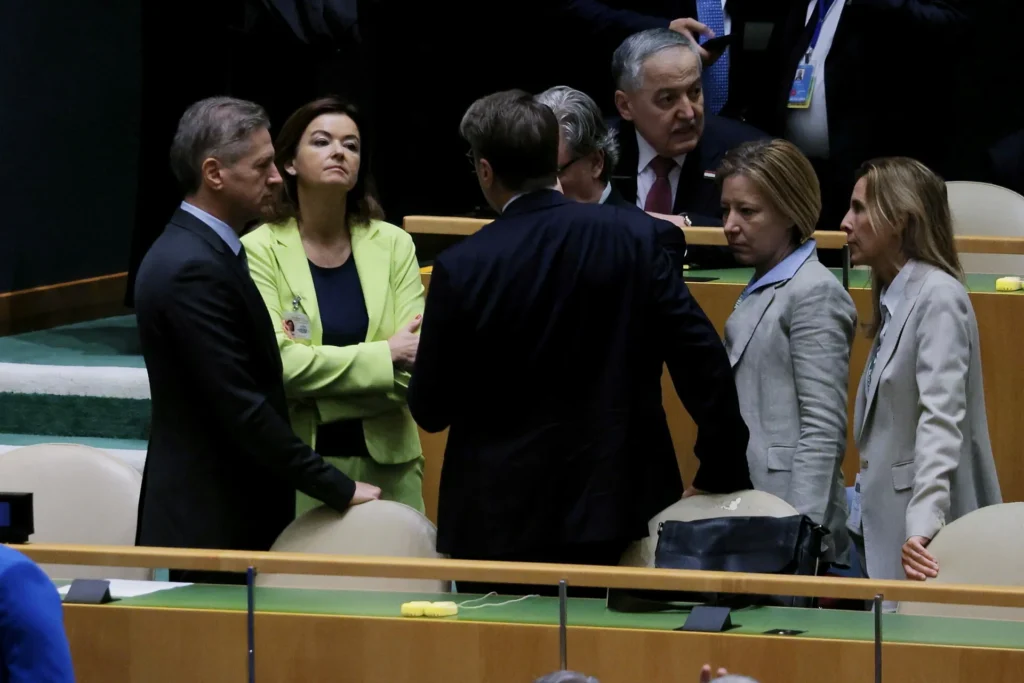A few days ago, MPs of the Left party (Levica) publicly called on the government they are part of to stop military aid to Ukraine. The position of an extremist and anti-NATO party could have been carelessly disregarded as part of the folklore of political extremists, had it not been for the fact that, at the same time, there were indications that the appeal also had broader government support. One of these indications is that a quiet diplomatic channel is to be established between Ljubljana and Moscow.
When it comes to the question of Ukraine, the Golob government has so far followed the example set by the government of Janez Janša. The latter, when he was still the Prime Minister – together with former Polish Prime Minister Mateusz Morawiecki and Czech Prime Minister Pert Fiala, established a new standard for support for Ukraine, not only in Slovenian politics but also in Europe, despite the criticism of current Minister of Foreign and European Affairs, Tanja Fajon, and the Left party. The Golob government has continued with military aid packages to the invaded Ukraine but has not publicly announced this aid.
The pro-government Delo newspaper recently reported that since the extradition of Russian spies captured on Slovenian soil, quiet diplomatic channels with Moscow have been reopened. Through this quiet channel, Golob is said to have told the Kremlin authorities that he does not believe that peace negotiations to end the war in Ukraine could take place without Russia. Delo also reported that pro-Western “whisperers” are said to be losing ground in the “Sunny Court” of the current Prime Minister, and will consequently have less and less influence on policy-making towards Russia.
Attending NBA games instead of peace conferences
This is supported by the Prime Minister’s behaviour in June this year, when he decided to attend a basketball game in Dallas to watch Luka Dončić play, instead of attending a peace conference in Switzerland with Ukrainian President Volodymyr Zelensky. He also caused a lot of annoyance on the left at the time. The President of the country almost accused him of irresponsibility and dereliction of duty, while he was posting “selfies” with his partner, Tina Gaber, on social networks. This kind of dereliction of duty could be interpreted as a peculiar, even eccentric, signalling to the Kremlin.
Golob’s “pivot”
It is also no secret that the Golob government is pursuing a policy that is moving away from the Western consensus. This trend is less noticeable in its policy regarding Ukraine, but all the more noticeable in the policy related to the Israeli-Palestinian conflict, where Slovenia is behaving and communicating not as a member of the Western bloc, but as a member of the non-aligned movement. Both the Ukrainian issue and Slovenia’s attitude towards Israel were the reasons for the visit of the Director of US Intelligence to Ljubljana a few days ago.
The question of how far the Left party’s appeal can go remains open. It is no secret that the other two coalition parties, the Social Democrats (Socialni demokrati – SD) and the Freedom Movement (Gibanje Svoboda) parties also have anti-Western tendencies. We need only recall the votes of former SD party MEP Milan Brglez and the active online activism of the Freedom Movement MP Miroslav Gregorič.
Dr Pogačnik: Slovenia remains on the margins
Dr Miha Pogačnik argues that this kind of reporting about “quiet diplomatic channels” is not appropriate, as Slovenia would need a mandate from a larger power if it really wanted to influence developments. “The Golob government is simply too weak to dictate a solution or to bring something to the table that the European Union and NATO would be happy to accept without first consulting on it,” he explained.
He also spoke about the background to such communication channels. “Clearly, Slovenia is full of nostalgia for the former and new socialist countries. The government has entangled Slovenia in things it should not have been entangled in. It has a familiar attitude towards autocratic and theocratic, and even dictatorial regimes. Even the presidency of the UN Security Council has not brought anything new.”
When asked what the Prime Minister actually meant when he said that he could not imagine peace negotiations without Russia, which is a kind of tautology, he replied: “There must be two sides to any negotiation, but neither of these sides is the government of Dr Golob, which is, at the end of the day, not a factor in solving any world issue, and never will be. Such statements are of interest only to the Slovenian public.”
Dr Pogačnik also believes the information about a silent communication channel is sensationalist reporting. “But if our Prime Minister is able to prevent Russia’s aggression against Ukraine, with all the consequences it entailed … Meaning, if he is able to get Russia to withdraw to its internationally recognised borders, to pay reparations to Ukraine, to extradite the war criminals, including President Putin, then that’s great, because then we will rise to the status of a superpower,” Dr Pogačnik concluded sarcastically.
Ž. K.


